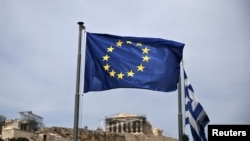Greek Prime Minister Alexis Tsipras called on his fractious Syriza party to rally behind the government on Tuesday as time runs critically short to unlock funding from international lenders and avert a debt default.
Tsipras made his plea as Greek negotiators pushed to narrow differences with the European Union and IMF creditors over a cash-for-reform deal on which the country's future in the euro largely depends.
The two sides were expected to continue talks through Tuesday to try to hammer out a deal, in a sign that they were moving closer to a compromise despite fierce protestations about the inadequacy of the other side's proposals.
With the Brussels negotiations entering a decisive phase, European officials took a tough stand, expressing their frustration with Greek negotiating tactics and trying to impress on Athens the depth of the risks that it is running.
"We will do everything to keep Greece in the eurozone ... but our patience is running out," Finnish Finance Minister Alexander Stubb said.
Jeroen Dijsselbloem, who chairs the Eurogroup of eurozone finance ministers, dampened any expectations that a new Greek proposal promising more reforms and austerity in return for funding might offer an easy route to a deal.
"I've heard a lot of optimism from the Greek side, and it's an underestimation of the complexity of what's being asked of them," Dijsselbloem told the Dutch RTL Nieuws TV station.
German Chancellor Angela Merkel, who is due to meet Tsipras on Wednesday along with French President Francois Hollande, has already stressed the urgent need for a settlement.
Greece's bailout program with the EU and International Monetary Fund expires at the end of this month, and Athens must make big debt repayments to the IMF by then that will probably be impossible without new funds from its creditors.
Tsipras issued his call for unity at a meeting of Syriza's political committee, which represents the party's factions ranging from pro-Europeans to hardline communists.
"Alexis Tsipras believes we are now at the most crucial point of the negotiations and the party must play a substantial role in supporting the government in this effort," a government official said in a statement after the meeting.
Tsipras has to win over not only the lenders but also members of the leftist Syriza party who resolutely oppose the punishing austerity terms that the EU and IMF have insisted on in return for releasing bailout funds.
Early optimism
The day began with a mood of optimism in Athens after the government announced it had sent the new proposal to Brussels, agreeing to raise value-added tax rates further and proposing higher budget surplus targets. The Greek stock market closed up 0.6 percent after rising over 2 percent earlier in the day on hopes a deal was near.
The chief spokesman for the European Commission said the EU executive was still studying the suggestions but some officials swiftly dismissed the proposal.
"What has been submitted is not sufficient to move the process forward," said one EU official. Another said it was "not sufficient and not acceptable to member states."
A source then said Greece was working to revise the proposal. Athens would talk with creditors on Tuesday with the aim of narrowing differences so Tsipras can finalize a deal in Brussels on Wednesday, the source close to the talks said.
But the situation remained fluid and Dijsselbloem said it was not even certain Tsipras would meet Merkel and Hollande, although all three are due to be in Brussels on Wednesday.
Only last week, Tsipras dismissed as absurd the creditors' most recent cash-for-reform offer, but on Tuesday he offered hope the talks would succeed.
Signaling room for compromise, he singled out Greece's budget surplus before its debt repayments, which Athens wants to keep as low as possible to free up funds to help a population that has suffered badly during five years of economic crisis.
But he showed no sign of yielding to the creditors' demands that Athens cut pensions.
"I think we're very close to an agreement on the primary surplus for the next few years," he told Italy's Corriere della Sera newspaper. "There just needs to be a positive attitude on alternative proposals to cuts to pensions or the imposition of recessionary measures."
Waves of austerity
Since Syriza won elections earlier this year, Tsipras has repeatedly denounced the futility of imposing waves of austerity on a country whose economy has already shrunk by a quarter, radically reducing living standards and sending unemployment soaring.
But Greece has received nothing from its creditors since last August and they are unwilling to release the remaining bailout funds without Athens making the reforms that they believe are essential if it is to stand on its own two feet.
Tsipras warned against assuming that if Greece defaults it could be allowed to fall out of the eurozone without profound consequences. "It would be the beginning of the end of the eurozone," he said. "If Greece fails, the markets will immediately
go to look for the next one. If negotiations fail, the cost for European taxpayers would be enormous."





